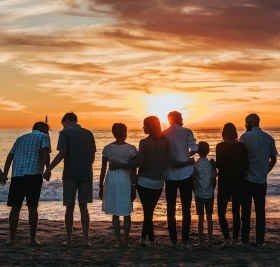The Intangible Significance
of Living
by Susan Scarlett
Page 3 of 3
Onion: And what was the result of that? Did you offer guidance to help her learn to manage her fear of conflict?
The Family: We didn’t have to. We took care of whatever the issue was.
Onion: Oh, really? Does it feel like they “took care of whatever the issue was”?
Me: Yes and no. At the moment, yes. In the long run, though, I think their help, even though it came from love, didn’t always help because I didn’t learn how to take care of myself.
The Family: (unintelligible frustrated muttering amongst themselves)
Onion: What are you feeling in that regard now?
Me: This journey is showing me the way. Everyone’s questions and the songs we’re singing are helping me get more honest with myself. I’m learning to recognize fear and anger and hurt. I live with chronic pain and a degenerative disease, and I’m finally trusting that I can’t always be there for others, even if I want to, and that it’s OK to ask for help for myself, if it’s needed.
Onion: … and …???
Me: I’m feeling stronger, more confident. Still afraid, and yet somehow stronger. I feel myself wanting to open to the potential of a new sound, a true sound, one that allows me to see, remember, feel and ultimately admit painful and possibly ironic truths about myself. I realize I missed whole movements of the symphony of my life, the ones where I would have learned self-confidence and courage and self-efficacy. I now know that no one has a perfect fairytale life, and that it’s not just others who get cancer and Parkinson’s; it’s me, too. I now know that I wanted to believe that my family’s conversations about suicide were actually about euthanasia, a sensitively guided way out of an untenable situation.
In the end, those talks were not about anything close to euthanasia, as evidenced by the fatal actions taken by my grandmother and by my father – actions taken entirely on their own. They were simply a way to escape pain, both physical and emotional. Mistress Suicide prevailed – perhaps because they didn’t have a counterbalance, friends and family to talk with, like I do. Perhaps sensing my sadness, Dad recently reached out to me in a dream. His few words – “I didn’t know what else to do” – told me of his desperation. Those few words, and the anguished sound in his voice, also suggested to me that when the shape-shifter arrived, she reminded him of the gun none of us knew existed.
Onion: … and … what happened then?
Me: There was no escape. Maybe their immediate pain ended for them, but it didn’t go away. No, it morphed into a thousand other versions of pain as experienced by everyone they left behind. One example is the fact that I’ve spent the last 20 years justifying my father’s unexpected and violent death; I felt the need to somehow make sense of it when others asked questions. In doing so, I drained myself of the chance to feel what I felt. Shock. Anguish. Pain. Disbelief. Distress. Heartache. Emptiness. Helplessness. Even anger. In dealing with the terrible reality of his death, I needed to be present for myself, and I wasn’t. Now I am. Now I understand that being in service is not always a gift, not if it’s at my own expense. My truth and my reality do not include suicide as an option, not if it’s a solitary act; not any longer. I have hope and a belief in the potential for positive change. I have a family and friends who love me. I have reasons to live.
Onion: Anything else?
Me: Yes, I am just so grateful to have a chance to say Thank You to all of you. This journey showed me the way to understand basic truths about myself, truths I had not known how to access on my own. It helped me take risks. It helped me grow strong. Most of all, it helped me understand the intangible significance of living – the value and the potential of Life.
